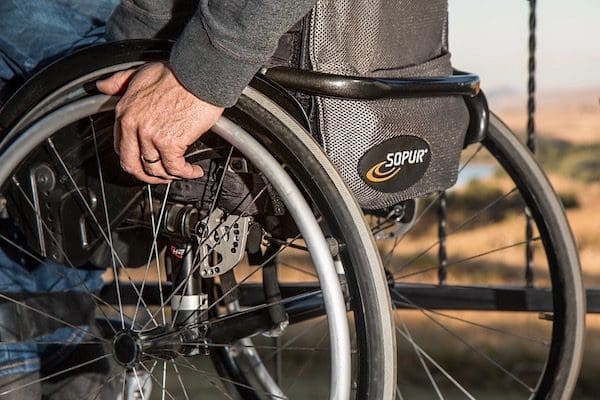Hubby made a good choice when he was offered a third chemo. He declined. “The other two didn’t do much good,” he reasoned. That’s when the oncologist asked if we wanted a referral to hospice care.
We were hesitant. Isn’t it too soon for hospice care? I mean, after all, Hubby was planning to walk out of this appointment on his own two feet. No wheelchairs involved. Don’t you call in the hospice troops when your loved one has only a few days left?

Photo credit: Pixabay
Even though I worked at the cancer center and had a general idea of what hospice care involved, I still carried the notion that they get involved once the patient has reached dire circumstances.
Unfortunately, too many people think this way.
I recently read a book, Being Mortal, by author and surgeon Atul Gawande who had assumed hospice care hastened death since hospice patients choose to forego treatment. In his book, though, Dr. Gawande cites studies that prove length of life is oftentimes extended for those who stop additional drastic surgeries or treatments. And it is often a good quality of life.
This certainly was the case with Hubby.
Dr. Gawande is now a proponent of having a written Advanced Directive because it encourages people to talk about what they want before a crisis occurs.
Gawande says that most end-of-life patients simply want to share memories and mend relationships and make their peace with God. They want to know that those left behind will be okay:
The discussion was what mattered most. … If end-of-life discussions were an experimental drug, the FDA would approve it.
Back when Gary was earning frequent flyer miles at the hospital, a kindly palliative care physician stopped by our room and engaged us in conversation about our children and Hubby’s career and other life experiences.
And in between, he asked the important questions. What do you understand your prognosis to be? How do you want to spend your time if your health worsens? Who do you want to make decisions if you can’t?
“What is your greatest concern about what the future holds,” he asked my husband.
Without hesitation, Hubby pointed at me and said, “Leaving her behind.”
We didn’t think Gary was dying that night. But to have the conversation about death and dying and the terminal patient’s wishes clear and on paper with his signature – this took a tremendous load off my mind as the caregiver.
Dr. Gawande writes in Being Mortal (an interesting read, by the way):
Endings matter, not just for the person but, perhaps even more, for the ones left behind.
I so agree with this. Hubby’s last couple months were an exceptionally sweet time. His dry humor was still in place. (He said to a friend who stopped by: “It sure is hard to die with so many people visiting.” Yep, that was Hubby.) His pain was under control; we said everything we needed to say to each other; we were steeped in unexplainable peace.
And that all mattered to me. Immensely.
* * *
What about you? Even if you’re not a terminally ill patient, have you completed an Advanced Directive? Do you feel educated enough about hospice care should it ever come to that for you or a loved one? (Here’s an earlier blog about services and support offered by hospice care: “How to know if hospice care is right for your loved one.”)
P.S. If you found this post informative or know of someone who could benefit from it, please share, tweet or pin.

Margaret
Your journey is almost a mirror image of mine and my husbands. The doctor talking to us about hospice was a shock to us as we thought we had lots of time left, but it turned out to be an amazing experience the nurses are the most caring people I have ever met and they prepare you so well, with pain management Keith and I were able to fully enjoy the time we had left together and talk over what would happen with both of our children. Thank you for your beautiful post
Marlys Johnson
Our hospice nurses were equally amazing, Margaret. In fact, the field nurse who came to our house was a perfect match for Hubby’s dry humor – she could dish it out as well as she could take it! I’m glad you had a positive experience with hospice care. And thank you for your kind words.
Terri
My Jim was on Hospice exactly a year to the day we signed up, it was right for us. He had begun another round of chemo, he did not want, because he was afraid if he quit his oncologist no one would prescribe his pain meds which he needed so badly.
We watched the video “Being Mortal” and the last patient was the one that convinced him it was okay, the old man at the end, and he realized that he would never feel better than today and chemo would make his days worse, what days that were left.
I am glad we did it, while there are regrets, it was beautiful.
Terri
Terri
I should mention we contacted Hospice on our own, after our last appt when hubby refused chemo, and doc was offering nothing else but more chemo options, we went to his primary for the referral and never looked back. They were awesome.
Marlys Johnson
Terri, I didn’t know “Being Mortal” was in video format (I read the book). Good to know.
It’s interesting to hear your words – “beautiful” and “awesome” and Margaret’s phrase below, “amazing experience.” These words fit our hospice care experience, along with “peaceful” and “restful.” I say interesting, because these aren’t words one normally associates with the process of dying. I am so very grateful.
Carol
Marlys, when my father was diagnosed with stage 4 cancer last summer we didn’t know he’d be gone in less than a month. Because he had so little time to process that his life on this earth was coming to an end, he was hesitant to opt for hospice. But because we had to wait for tests to determine if he was eligible for medical interventions which might extend his life by only weeks, he chose to let nature take it’s course. I can’t adequately express how grateful I am for his hospice experience. The nurses and staff were able to manage his pain and create a peaceful environment that allowed all of the family to let go and say our goodbyes. For us, hospice was the right choice.
Marlys Johnson
I’m glad to hear you and your family had a positive experience with hospice, Carol. From your vantage point as a nurse, it seems that hospice nurses are a special breed. (Although I happen to think all nurses are a special breed from my vantage point of being a cancer caregiver for ten years.) Thank you!
Curt F
Thank You Marlys for your honesty and vulnerability. It brings comfort and hope during uncertain times. I miss Gary.
Marlys Johnson
I think cancer helped make us both – Hubby and me – more honest and vulnerable. Although it took a while for us to get to that place. Did you find the same with your experience?
Wendy
Thank you for sharing such a beautiful and touching story. We need to do a better job at educating the public about Hospice & Palliative Care. I worked in hospice and I have cared for loved ones at end of life. A few books I recommend are “Dying Well” and “The Best Possible Care” by Ira Byok, MD. For Veterans or family of Veterans I also recommend “Peace At Last” by Deborah Grassman and “Warriors Return” by Dr. Edward Tick. (Deborah Grassman is coming to town soon and will speak at Central Oregon Veterans Ranch)
Blessings to all!
Marlys Johnson
Thanks for the book recommendations, Wendy! Excellent! I think we might be surprised at how little most people understand about hospice care.